Alcohol May Fool Your Brain Into Thinking You Are Starving

Introduction
Anyone who has ever had alcohol or seen people drinking may have noticed the curious effect that it seems to have on increasing appetite.
Why is is this strange?
Well alcohol is very calorie dense.
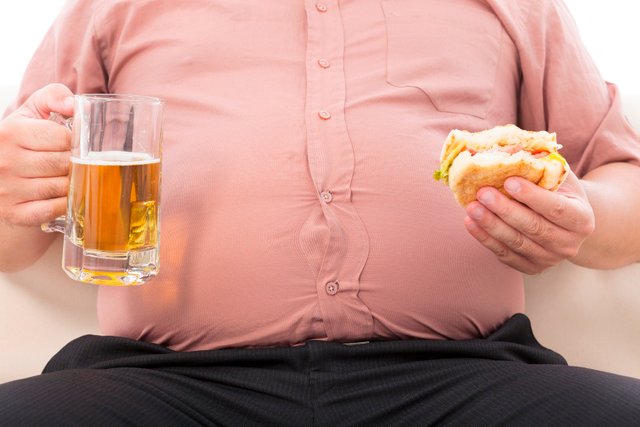
Every gram of alcohol contains 7 calories which is second only to fat (at 9 calories per gram).
That doesn't even take account of the extra calories from sugar that many alcoholic drinks contain.
Normally when you eat something that is calorie dense it suppresses your appetite.
Alcohol seems to go directly against that.
Today I came across a new paper in Nature Communications that is suggestive of the mechanism behind this.
N.B. - Terminology : Alcohol = Ethanol
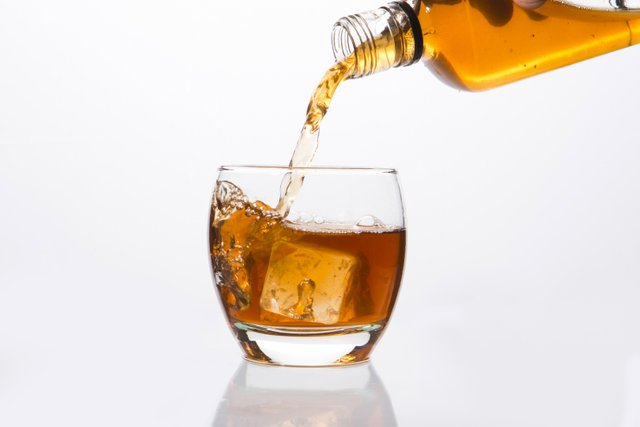
The correct name for what we commonly refer to as alcohol is actually "ethanol".
Technically alcohols are a group of compounds of which "ethanol" is just one type.
I will apologise in advance for using the terms interchangeably as it is very easy to slip up and go back to saying alcohol instead of ethanol!
Quick "TLDR" Summary of the Paper
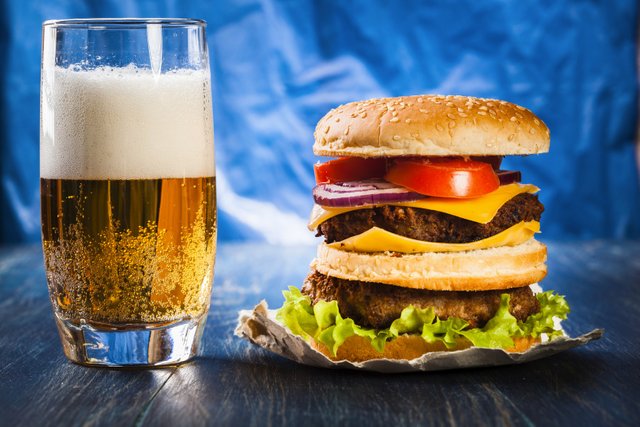
In case you are not so interested in the more detailed analysis of the paper you can just read this!
The paper uses research on mice to demonstrate how a particular type of neuron known as "Agrp" in the hypothalamus of the brain seems to be essential to the appetite stimulation effect of alcohol.
NB - The hypothalamus is one of the major "regulatory centres" in the brain which controls a huge number of things. (Check out Wikipedia for a summary).
From the paper:
Popular explanations for alcohol-induced overeating include an alcohol-induced loss of self-control, leading to a disregard for societal constraints on eating4,6,7. Biological factors required for alcohol-induced overeating remain elusive2,3,4.
An essential eating-stimulating signal is provided by Agrp neurons, a starvation-activated, molecularly distinct hypothalamic cell type12,13. The Agrp cells are found in mice and humans, and their chemogenetic or optogenetic stimulation is sufficient to cause rapid overeating, even in the absence of energy shortage14,15,16,17.
Agrp neurons are involved in creating a "starvation" signal. Their activation increases appetite and hence eating significantly.
The brain is literally being "fooled" into believing that it is being starved.
This study also quite elegantly shows that activation of Agrp neurons is a necessary part of alcohol induced stimulation of appetite (in mice at least).
The authors cite a large amount of existing research that suggests that the mechanisms regulating appetite in mice and humans are very similar.
This implies that the research could be extrapolated to humans although as always more research would be needed to confirm that.
More Detailed Discussion of the Results and Findings
1) Ethanol increases appetite in mice
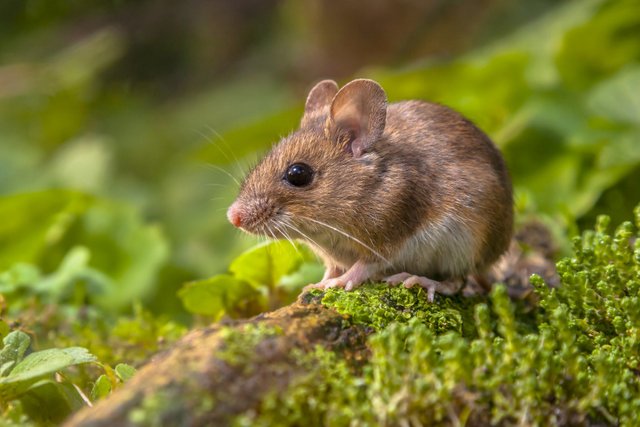
The first part of the experiment tested whether ethanol (alcohol) did induce overeating in mice. To do this they simulated the equivalent of a weekend alcohol binge in the mice:
In an ‘alcoholic weekend’ experiment, each animal was given EtOH for three days, and saline for 3 days before and after (see Methods for consideration of EtOH dosage). The food intake was significantly and reversibly increased on the EtOH days, and the magnitude of this increase was similar in males and females (Fig. 1a,b; statistics are given in the figure legends). The effect of EtOH on food intake was also apparent at finer (hourly) time points (Fig. 1c; Supplementary Fig. 2). These data suggest that alcohol-induced overeating is an evolutionarily conserved biological phenomenon occurring across mammals, irrespective of aesthetic beliefs and social conditioning.
Note "EtOH" is the authors' abbreviation for ethanol (alcohol).
This increase is best illustrated by this graph:
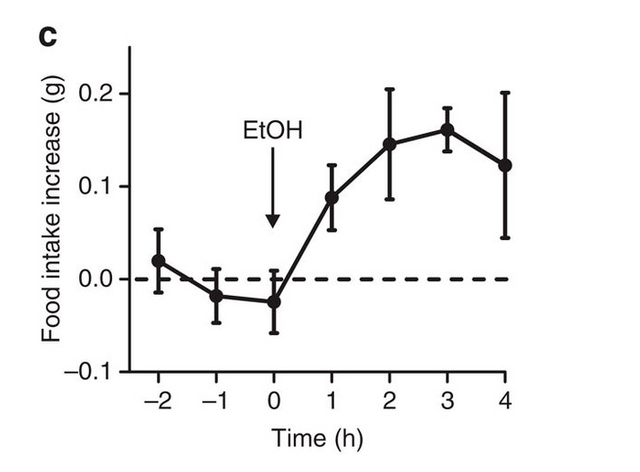
It is quite clear from the graph that the administration of ethanol leads to a significant increase in food intake.
2) Ethanol Increases the Activity of Agrp cells
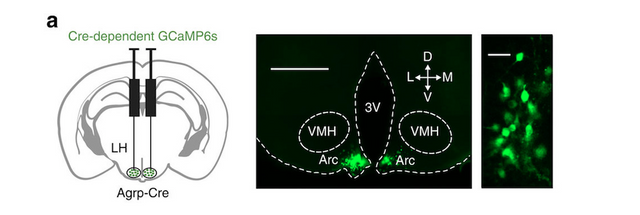
The second part of the experiment involved testing the activity of the Agrp cells within the hypothalamus of mice following administration of ethanol.
The detailed method is beyond the scope of this discussion - in basic terms it involved monitoring calcium ion activity within the cell cytoplasm (body) which correlates with excitation.
Of particular interest is the fact that the activation of these cells via administration of ethanol was consistent with activation previously observed in fasting/starvation.
The researchers also found that the effect of excitation by ethanol on the Agrp neurons could be blocked by inhibiting NCX (a type of sodium/calcium exchange channel that is activated by calcium level rises within the cell).
This is of interest (for me at least) as it could be a potential target for drug development.
3) Blocking Agrp prevents ethanol based appetite stimulation
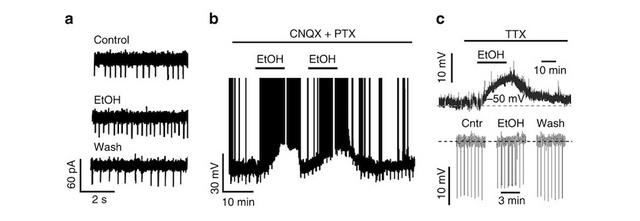
(I won't even pretend to know what these graphs mean. The written explanation is easier to understand. I have just added them for visual interest.)
In the final and rather more complicated part of the experiment, the researchers showed that by using an agent to block the activity of Agrp neurons they could prevent the stimulation of appetite via ethanol.
They used a very specific and convoluted method to do this which you can read in more detail in the paper but what they actually showed is:
While these findings do not preclude EtOH actions on targets other than Agrp, they do imply that such actions are insufficient to cause eating without Agrp cell activity.
Translation: ethanol may have appetite stimulating activity via other brain regions, but you need the Agrp cells to fire for it to work.
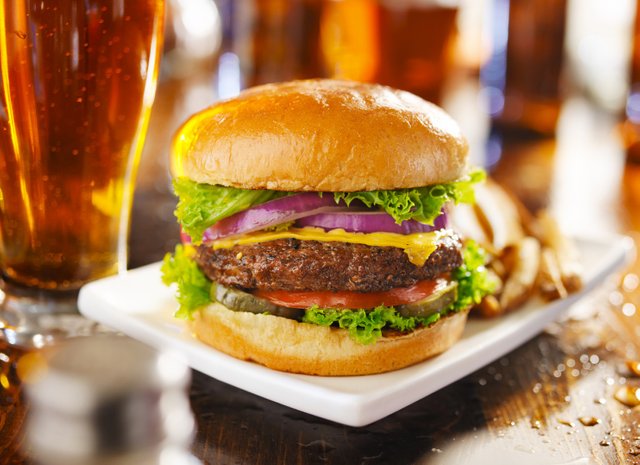
If you block the Agrp cell activity then you block the appetite stimulation from ethanol/alcohol.
The authors discuss this in the "discussion" section too:
Apart from the Agrp cells, other powerful controllers of food intake exist in the brain, for example, MC4R neurons of the paraventricular hypothalamus36, Vgat neurons of the lateral hypothalamus37 and neurons of the parabrachial nucleus34. Crucially, the control of feeding by some of these modules does not require Agrp neurons35.
Therefore, alcohol actions on the latter non-Agrp eating controllers would be expected to alter eating even when Agrp cells are silenced.
However, we found that when Agrp cells were chemogenetically silenced, alcohol no loger modulated food intake.
Why does this matter?

- It strongly suggests at least one critical brain region and set of neurons (Agrp) for the appetite stimulating actions of ethanol.
- It contradicts previous theories relating to loss of (social) self control following consumption of alcohol.
- It may provide a model for further research and investigation of other types of eating disorder whether they involve overeating or not. Do Agrp neurons have a role in other disorders?
- It also suggests possible locations for drugs that could be used to modulate the effect of Agrp neurons on appetite, for example NCX or hM4Di (see the paper for more information).
Problems
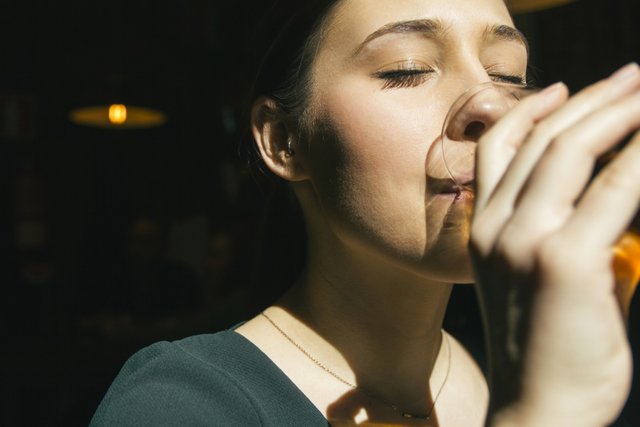
- Study size. The study does not explicitly seem to state sample sizes but I did see some figures in the supplementary materials referring to 6 mice pairs which suggests 12 mice. It is not entirely clear though.
- The use of mice. Ultimately some kind of conformation would be required that this applies equally to humans. We may be able to infer this but further direct human research will eventually be needed for proper confirmation.
Conclusion

This study strongly suggests that Agrp cells are a critical component for alcohol induced appetite increase and over-eating.
In a sense alcohol "fools" the brain into thinking it is starving!
One would assume that this same mechanism is at work in humans but this would require confirmation in human studies.
Overall this is a fascinating starting point for further research.
References:
- Cains, Sarah, Craig Blomeley, Mihaly Kollo, Romeo Rácz, and Denis Burdakov. 2017. “Agrp Neuron Activity Is Required for Alcohol-Induced Overeating.” Nature Communications 8 (January): 14014.
- Gatineau M, Mathrani S. Obesity and alcohol: an overview.
Oxford: National Obesity Observatory, 2012
Thank you for reading.
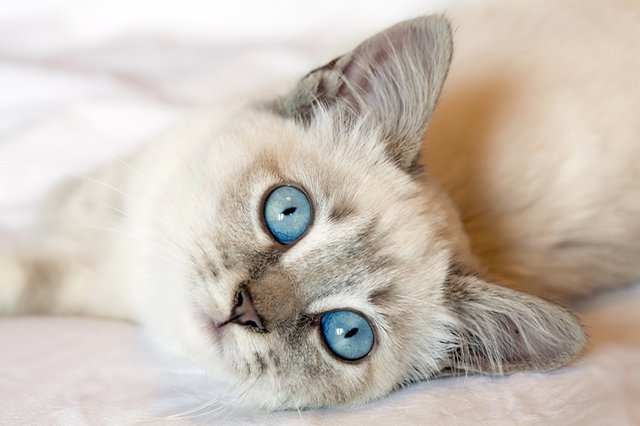
Before you go have you filled in the Coinbase form to list STEEM? It only takes a few seconds. THIS POST shows you how.
If you like my work please follow me and check out my blog - @thecryptofiend
All uncredited photos are taken from my personal Thinkstock Photography account. More information can be provided on request.

Hello @thecryptofiend,
Congratulations! Your post has been chosen by the communities of SteemTrail as one of our top picks today.
Also, as a selection for being a top pick today, you have been awarded a TRAIL token for your participation on our innovative platform...STEEM.
Please visit SteemTrail to get instructions on how to claim your TRAIL token today.
If you wish to learn more about receiving additional TRAIL tokens and SteemTrail, stop by and chat with us.
Happy TRAIL!
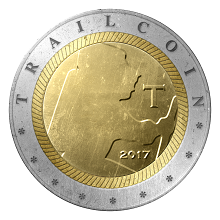
Thank you so much that is very kind:)
The study could explain why kebab and other fast-food shops do so well on the same streets as nightclubs.
Alcohol has a lot to answer for. Including why some people believe they can dance, why the same people believe they are whispering when they are really shouting, why they believe they can (and should) fight everyone and why they think their friends absolutely need to know they're loved at 3am...
Good post, very well done. Thank you.
I think this has to do with again, another cultural concept. People always used to gather around fire, at night, dancing and eating. Kebabs, burgers, gyros and other fast foods have the perfect combination of carbs, protein and sugar, all that appear to out instincts.
They are also pretty delicious!
Not to mention pizza places! I remember back in the olden days: pizza joints used to stay open an hour after the bars closed - and they were suspiciously crowded in that last hour ;)
Don't ask me how I know this. :D
I have noted this too most of my life too. It does definitely stimulate appetite from my own personal experience as well as a substantial body of research evidence even if there may be disagreement on the precise mechanisms.
Thank you:)
Great comments Michelle LOL!
Haha! Observational humour, I assure you ;)
UV with all 100%... of my 64% remaining vote power today lol
#MinnowLife
I actually knew about half of all this with my past research on dietary facts etc as I used to train and train others at a professional level in some regards. I always knew the calorie dense facts. I could never reconcile the two.
I have not had a drop of alcohol since the summer of 2003.
Since high school in all those years prior from 85 / 86 on --- I drank like a fish and I was always hungry on my drinking nights with my buddies etc.
Thanks for the info man. Thumbs Up.
Thanks mate. Yes this is consistent with most people's observations I think but we will need to see if this exact mechanism is the the main reason in actual human studies. This is the start of the research.
I am really looking forward to see the follow-up of such a study (let's hope there will be some).
In many biology / health studies, I am always impressed to see the smallness of the size of the samples. Is it so hard to get enough statistics in these fields?
I think the main limiting factor is cost and time in these studies. Because of the way they were doing this - the 3 part nature of the actual experimentation, the electrical monitoring of those Agrp neurons etc it is probably too time consuming and labour intensive to have a larger sample size.
Great and Very informative post as always! keep sharing!
Thank you:)
This post has been ranked within the top 10 most undervalued posts in the second half of Jan 15. We estimate that this post is undervalued by $36.26 as compared to a scenario in which every voter had an equal say.
See the full rankings and details in The Daily Tribune: Jan 15 - Part II. You can also read about some of our methodology, data analysis and technical details in our initial post.
If you are the author and would prefer not to receive these comments, simply reply "Stop" to this comment.
Thank you:)
Hence what my friends and I call the "beer munchies" -- that craving for a massive plate of eggs, bacon, and hashbrowns after a night of boozing.
Lol yes:)
Now, i think the restaurants know this.
That's why they make you order a wine before anything
Yes in fact that is something they mention in the paper - the idea of an aperitif to stimulate appetite:)
Knew there was a reason I always want a slice of pizza after a Saturday night on the town!
Lol yes!
You're bringin back the SteemSquad tag and rockin it eh?
I always use it. Not sure if it is still active - it's like a good luck charm for me lol!
LOL.
I've seen it used again lately by others I know. I likey.
Cool then may be it will come back:)